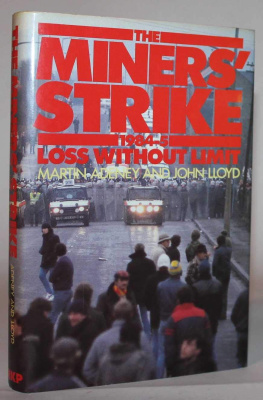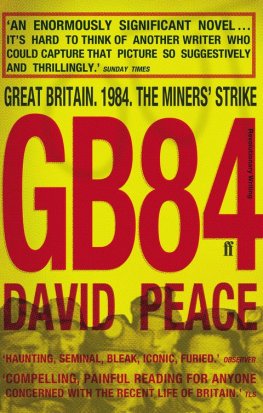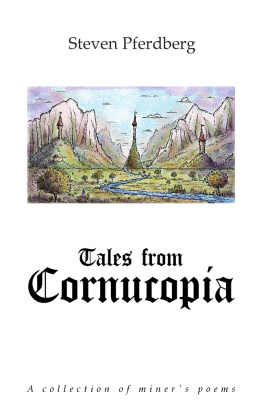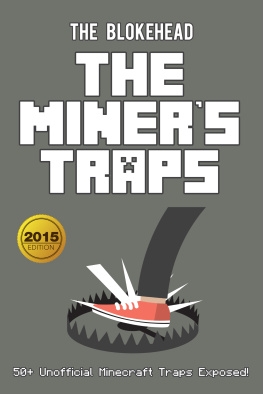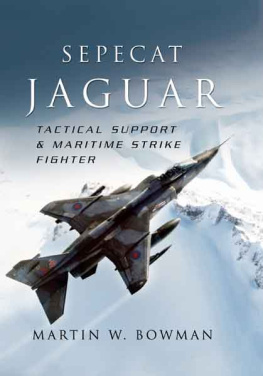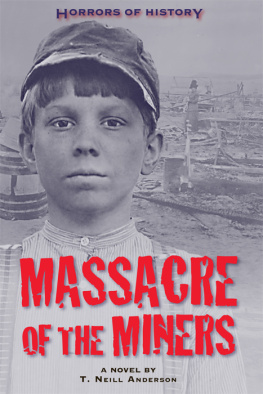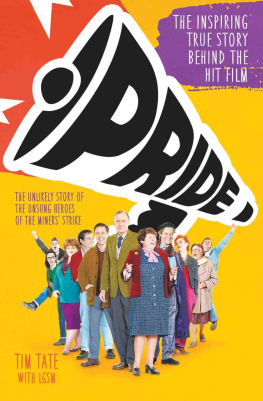ROUTLEDGE LIBRARY EDITIONS: POLITICAL PROTEST
Volume 14
THE MINERS STRIKE, 19845
THE MINERS STRIKE, 19845
Loss Without Limit
MARTIN ADENEY AND JOHN LLOYD
First published in 1986 by Routledge & Kegan Paul Ltd
This edition first published in 2022
by Routledge
2 Park Square, Milton Park, Abingdon, Oxon OX14 4RN
and by Routledge
605 Third Avenue, New York, NY 10158
Routledge is an imprint of the Taylor & Francis Group, an informa business
1986 Martin Adeney and John Lloyd
All rights reserved. No part of this book may be reprinted or reproduced or utilised in any form or by any electronic, mechanical, or other means, now known or hereafter invented, including photocopying and recording, or in any information storage or retrieval system, without permission in writing from the publishers.
Trademark notice: Product or corporate names may be trademarks or registered trademarks, and are used only for identification and explanation without intent to infringe.
British Library Cataloguing in Publication Data
A catalogue record for this book is available from the British Library
ISBN: 978-1-03-203038-8 (Set)
ISBN: 978-1-00-319086-8 (Set) (ebk)
ISBN: 978-1-03-201482-1 (Volume 14) (hbk)
ISBN: 978-1-03-201488-3 (Volume 14) (pbk)
ISBN: 978-1-00-317883-5 (Volume 14) (ebk)
DOI: 10.4324/9781003178835
Publishers Note
The publisher has gone to great lengths to ensure the quality of this reprint but points out that some imperfections in the original copies may be apparent.
Disclaimer
The publisher has made every effort to trace copyright holders and would welcome correspondence from those they have been unable to trace.
THE
MINERS STRIKE
1984-5
LOSS WITHOUT LIMIT
Martin Adeney and John Lloyd
For Ann and Mareia
First published in 1986 by
Routledge & Kegan Paul Ltd
11 New Fetter Lane, London EC4P 4EE
Reprinted 1987
First published as a paperback 1988
Set in Plantin
by Columns of Reading
and printed in Great Britain
by Cox & Wyman Ltd
Reading, Berks
Martin Adeney and John Lloyd 1986
No part of this book may be reproduced in any form without permission from the publisher except for the quotation of brief passages in criticism
British Library Cataloguing in Publication Data
Adeney, Martin
The miners strike 1984-5: loss without limit
1. Coal Strike, Great Britain, 1984-5
I. Title II. Lloyd, John
331.8928223340941 HD5365.M6152 1984
ISBN 0-7102-0694-1
ISBN 0-7102-1371-9 (pbk)
Contents
List of Illustrations
Preface
2 The coal question
3 Theres only one Arthur Scargill
4 A hoary old bastard who only wants to win
5 Fear of the abyss
6 Here we go
7 No request for assistance
8 The right to go to work
9 Inside Hobart House
10 The government is not involved
11 No other industry could do it
12 Our enemies front-line troops
13 Enough of being spat at
14 Your members have yet to be heard
Postscript
Notes
1 Portent of things to come. Ian MacGregor is flour-bombed, November 1983
2 (a) Wish they hadnt (i). Arthur Scargill salutes his supporters
(b) Wish they hadnt (ii). Ian Macgregor arrives at Edinburgh
3 Battle over the ballot
(a) Nottinghamshire miners call for a ballot
(b) NUM rally against Nottinghamshire members
(c) NUM executive members arrive for the delegate conference, 19 April 1984
4 Here we go. Chesterfield 1984
(a) Derbyshire area ralhes support
(b) Police support units in temporary accommodation
5 Casualties
(a) President, Orgreave, June 1984
(b) Picket, Orgreave, June 1984
(c) Carrying a colleague to safety, Rossington, October 1984
6 Orgreave pickets view (a) and (b)
7 Orgreave police view
8 Pit village tensions
(a) Police at Armthorpe, 21 August 1984
(b) Back-to-work miners vandalised house
(c) Cortonwood colliery marches back, March 1985
The sub-title of this book comes from a reply made by Arthur Scargill to the House of Commons Select Committee on Energy in November 1982. Pressed for his view on uneconomic pits, he said, As far as I am concerned, the loss is without limit because I am more interested in the investment which our men have put into this industry.
Loss without limit; it is almost a text for the strike. The governments blank cheque to the electricity generating boards; the huge bills for the policing; the damage to the fabric of society from the scenes witnessed during the dispute; the cost to the pits; the limitless antipathy that developed between working and striking miners; above all the bitter financial and personal suffering of miners and their families.
In this book we have attempted to talk to as many people with firsthand involvement in the events as we could. Unless otherwise stated, quotations are from our interviews with them.
Our thanks are due to many people who helped us, in the NUM and the wider trade union movement, at the Coal Board and in industry, among lawyers and police, and in Whitehall and the House of Commons. They are too numerous to mention, and a number, on both sides of the argument, were anxious that their names should not be used. We owe a considerable debt to our colleagues at the BBC and the Financial Times especially, at the BBC, John Fryer, and at the FT Geoffrey Owen, Philip Bassett and the FT labour staff. Our gratitude goes too to the Sheffield Star for the use of the files of day-to-day events in South Yorkshire.
Almost everyone we asked agreed to talk to us. There were two glaring exceptions and they were the most obvious. Arthur Scargill and Ian MacGregor are for once united in insisting on putting out their own authorised versions only.
The choice
The job of this book is not to give a chronological account of the mineworkers strike of March 1984 to March 1985: others have done that.1 It is rather to understand it.
The strike, constantly dramatic in itself, appeared to fade quickly from view as the waters of British civil society gratefully closed over it. The government sank in the polls - from a September 1984 figure of 42 per cent to a February 1986 figure of 34 per cent: rather the kind of figure which might be expected of a government midway through a second term. The tremors still were felt along the fibres of the TUC and the Labour Party: Arthur Scargill, the most compelling activist-orator of his generation, could still turn in the votes at the TUC and the Labour Party Conference in 1985 for a motion committing the Labour Party to reimburse the union for its fines and reinstate sacked miners, which most of the TUC elders regarded as undesirable. But the greater issues were the unions attitudes to present employment law, and the shape of employment law to come, and the familiar old chestnut of incomes policy. The daily and nightly news ceased to have one constant focus, and reflected a new round of arms talks between the old US president and a new Soviet leader, the violent dying agonies of apartheid, inner city riots and inner-cabinet feuds. The miners no longer intruded into everyday life through the screen or the printed page, which was how the vast majority of citizens of this and other countries experienced them.



